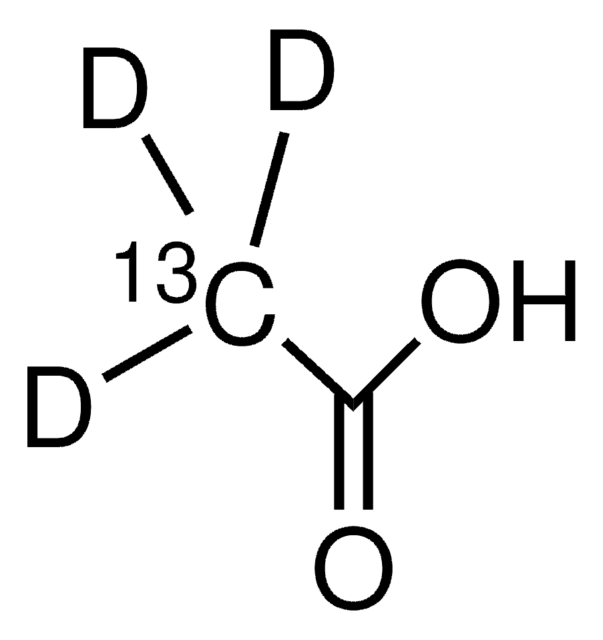151785
Acetic acid-d4
≥99.5 atom % D
Synonym(s):
Acetic-d3 acid-d, Tetradeuteroacetic acid
About This Item
Recommended Products
vapor density
2.07 (vs air)
vapor pressure
11.4 mmHg ( 20 °C)
isotopic purity
≥99.5 atom % D
Assay
≥99% (CP)
form
liquid
autoignition temp.
800 °F
expl. lim.
16 %
technique(s)
NMR: suitable
bio NMR: suitable
impurities
≤0.0500% water
water
refractive index
n20/D 1.368 (lit.)
bp
115.5 °C (lit.)
mp
15-16 °C (lit.)
density
1.119 g/mL at 25 °C (lit.)
mass shift
M+4
SMILES string
[2H]OC(=O)C([2H])([2H])[2H]
InChI
1S/C2H4O2/c1-2(3)4/h1H3,(H,3,4)/i1D3/hD
InChI key
QTBSBXVTEAMEQO-GUEYOVJQSA-N
Looking for similar products? Visit Product Comparison Guide
General description
Application
Acetic acid-d4 may also be used as a deuterated solvent in the 1H NMR spectral studies of the following:
- CB2, a CNBr peptide
- α - tocopherol succinate hydrophobically modified chitosan(CS-TOS)
Recommended products
Signal Word
Danger
Hazard Statements
Precautionary Statements
Hazard Classifications
Eye Dam. 1 - Flam. Liq. 3 - Skin Corr. 1A
Storage Class Code
3 - Flammable liquids
WGK
WGK 1
Flash Point(F)
104.0 °F - closed cup
Flash Point(C)
40 °C - closed cup
Personal Protective Equipment
Certificates of Analysis (COA)
Search for Certificates of Analysis (COA) by entering the products Lot/Batch Number. Lot and Batch Numbers can be found on a product’s label following the words ‘Lot’ or ‘Batch’.
Already Own This Product?
Find documentation for the products that you have recently purchased in the Document Library.
Customers Also Viewed
Articles
Use this reference table to find the coupling values and chemical shifts of our NMR (deuterated) solvents. Melting and boiling points, molecular weight, density, and CAS number are also listed.
Use this reference table to find the coupling values and chemical shifts of our NMR (deuterated) solvents. Melting and boiling points, molecular weight, density, and CAS number are also listed.
Use this reference table to find the coupling values and chemical shifts of our NMR (deuterated) solvents. Melting and boiling points, molecular weight, density, and CAS number are also listed.
Use this reference table to find the coupling values and chemical shifts of our NMR (deuterated) solvents. Melting and boiling points, molecular weight, density, and CAS number are also listed.
Our team of scientists has experience in all areas of research including Life Science, Material Science, Chemical Synthesis, Chromatography, Analytical and many others.
Contact Technical Service













